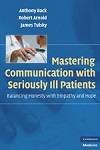Communication tips by Nursing on the Move.
 Are you a professional or a pre-professional?
Are you a professional or a pre-professional?
Do you use a second or foreign language at work?
Do you have a friend who speaks a foreign language at work or has a cultural background different from colleagues/customers?
During a consultation, it is important that patients feel comfortable. By providing a rationale when asking questions, you share the reasons for your actions and your queries. Doing so, you indicate that you acknowledge the patients’ concerns and that you are a good listener.
Providing a rationale is also a sign of respect. It helps patients understand why you ask certain types of questions, or why you want to zoom in on a particular aspect of their rapport.
‘Earlier on you mentioned nausea. I now would like to know more about it. When did it start?’
By providing a rationale, you encourage patients to provide you with better, more complete information. As the patient is aware of what you are interested in, they will be able to answer your questions properly.
For more information, tips and examples, click here.
You can find an overview of all communication tips by Communication for Professionals here.
Treating Patients With C.A.R.E.
May 2016, New Haven, CT, USA
Find more information here.
Mastering Communication with Seriously Ill Patients
By Anthony Back, Robert Arnold, James Tulsky
Physicians who care for patients with life-threatening illnesses face daunting communication challenges. Patients and family members can react to difficult news with sadness, distress, anger, or denial. This book defines the specific communication tasks involved in talking with patients with life-threatening illnesses and their families… shop the book.
Cues and Concerns by Patients in Medical Consultations: A Literature Review
by C. Zimmermann, L. Del Piccolo, A. Finset
Abstract
The aim of the current article is to review the peer-reviewed research literature on cues and concerns published between 1975 and 2006. To be included, articles had to report observational studies based on patient–physician consultations and report findings on patient expressions of cues and/or concerns…read more
Tip: More up to date educational events dealing with communication for doctors and health professionals can be found online in the Education Database »medicine & health«.
